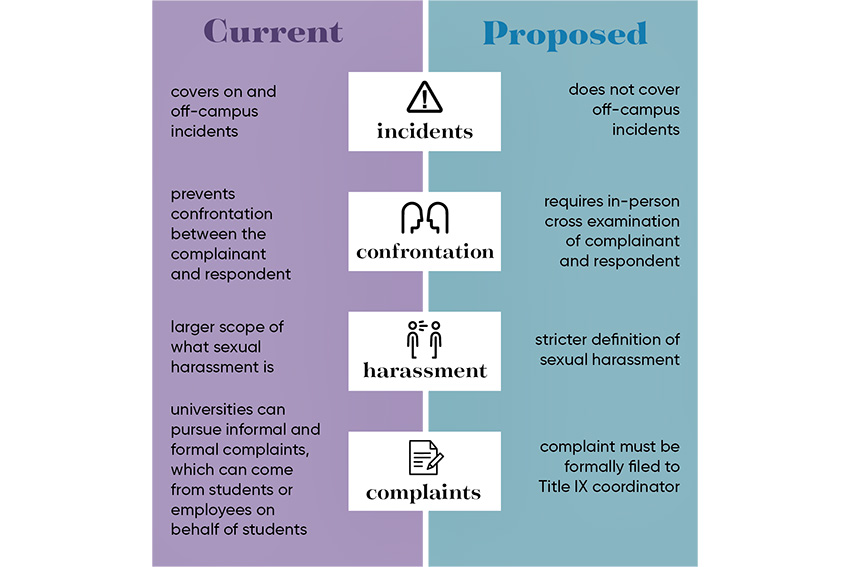Title IX is only a 37-word law, but its student and employee protections against gender discrimination are expansive and evolving.
In November, the U.S. Department of Education released proposed regulations it said would improve how schools respond to allegations of sexual harassment and assault.
“Every survivor of sexual violence must be taken seriously, and every student accused of sexual misconduct must know that guilt is not predetermined,” Secretary of Education Betsy DeVos said in a press release. “We can, and must, condemn sexual violence and punish those who perpetrate it, while ensuring a fair grievance process. Those are not mutually exclusive ideas."
The Department has said the proposed rules are meant to provide due process to students and help schools more clearly understand their legal obligations under Title IX.
But officials at UT are pushing back, saying the changes could be detrimental to students’ ability to seek recourse for allegations of sexual harassment and assault.
“Essentially what it’s doing is it’s limiting the liability of institutions because the Title IX law is telling institutions you have a duty to respond,” said Krista Anderson, UT’s Title IX Coordinator. “By putting all of these different provisions and kind of caveats on all of it, it’s really changing what the scope of Title IX is.”
The 1972 law states, “No person in the United States shall, on the basis of sex, be excluded from participation in, be denied the benefits of, or be subjected to discrimination under any education program or activity receiving Federal financial assistance.”
The proposed regulations would narrow the definition of sexual harassment and the manner in which universities can respond. The proposals were open to public comment for 60 days after their initial publication, and the Dept. of Education received over 104,000 comments, including one spanning 15 pages from the UT System.
The Dept. of Education declined to comment to The Daily Texan about the System’s complaints.
Definition of sexual harassment
The proposed regulations define sexual harassment as “unwelcome conduct on the basis of sex that is so severe, pervasive, and objectively offensive that it effectively denies a person equal access to the recipient’s education program or activity,” according to the Dept. of Education.
The current Title IX regulations require sexual harassment to be severe or pervasive, not severe and pervasive. The difference is some harassment could be severe but not pervasive or vice versa.
“(The Dept. of Education) is changing it (so) it has to be severe and pervasive and offensive, suggesting that a very unpleasant single evening of harassment is insufficient for the federal government,” said Daniel Sharphorn, UT System vice chancellor and general counsel, at a Texas House Higher Education Committee meeting last week.
The proposed regulations also say harassment has to deny access to one’s education, as opposed to merely limiting access, as the current regulations require.
“It has to deny access to an educational program, which suggests if a woman is victimized, she has to decide not to go to class in order file a complaint,” Sharphorn said in the higher ed meeting.
The current regulations also say harassment must be objectively and subjectively offensive, whereas the proposed regulations say it must be objectively offensive. Anderson said removing “subjectively” from the definition means the institution doesn’t have to consider the victim’s point of view on the impact of the offense.
“If (the harassment) is insufficient for the federal government, that’s one thing, but if they’re also trying to tell us we can’t do anything about it, that’s what’s problematic,” Sharphorn said in last week’s meeting.
The proposed regulations only hold universities liable for investigating harassment that takes place on campus or during educational activities, meaning anything that occurs off campus wouldn’t be actionable under Title IX.
“The idea that we could pursue a case that’s on this side of the street but not that side of the street is just nonsense,” Sharphorn said in an interview with The Daily Texan.
In 2017–18, 46 percent of student-related incidents at UT took place off-campus, whereas 21 percent took place on-campus, Anderson said.
Definition of sexual harassment
The proposed Title IX regulations change how universities can respond to allegations, too.
Current regulations require responsible employees — like teaching assistants and professors — to file Title IX complaints if a student confides in them about a case of sexual harassment. The Dept. of Education’s proposals would eliminate the responsible employee, saying only formal complaints made directly to the Title IX coordinator are valid.
Anderson said UT would find a way around those regulations if they become finalized by
using other University policies.
“Even though the proposed regulations are kind of eliminating that responsible employee,” Anderson said. “It doesn’t necessarily mean that an institution would eliminate that same obligation to report.”
The regulations would also mandate in-person cross-examinations of the complainant and respondent by advisors representing each party during Title IX investigations. Anderson said the requirement could deter students from filing complaints and participating in the investigation process.
“Cross-examination is adversarial questioning in nature,” Anderson said. “Complainants may be afraid of being confronted by the respondent’s adviser.”
Sharphorn said attorneys might argue cross-examination is better for due process, but the UT System is worried it would traumatize students.
“A plaintiff’s attorneys will tell you, ‘If I can grill somebody on the witness stand, I can get more information out of them,’” Sharphorn said to the Texan. “We just don’t think that’s necessary … It’s not a criminal trial, and it shouldn’t become one.”
Anderson said UT currently allows for indirect cross-examination where parties can submit questions to each other through the hearing officer presiding over the case, preventing personal confrontation between the alleged victim and the accused or advisers acting as attorneys.
“The hearing officer is actually the one who reviews those questions and then asks the questions up to the other party,” Anderson said. “They’re not siding with either person. They’re just overseeing the process.”
What’s to come
Overall, Anderson said the new regulations would restrict what conduct qualifies as sexual harassment.
“It’s not just the alleged behaviors meeting the definition of sexual harassment or sexual assault, but then you also need to have the criteria of actual knowledge in the form of a formal written complaint, the location of that incident and then it happening to someone in the United States as well,” Anderson said.
Anderson said UT will still include the same protections for students and employees — it just might be under a University sexual misconduct policy rather than Title IX. Despite the reported 104,000 comments the Dept. of Education has received, Anderson said the complaints might not be taken seriously.
“We’re presuming we’re going to get what’s already been written and just try to be as prepared as possible,” Anderson said.




















